Lanzarote: el papel de la crisis - Fundación César Manrique
Lanzarote: el papel de la crisis - Fundación César Manrique
Lanzarote: el papel de la crisis - Fundación César Manrique
Create successful ePaper yourself
Turn your PDF publications into a flip-book with our unique Google optimized e-Paper software.
power in the exercise of our right to vote in the public sphere. Socio-ecological<br />
dissatisfaction c<strong>la</strong>shes with the limitations of the market and with the poor <strong>de</strong>mocratic<br />
quality of the form of public representation which Robert Dahl calls polyarchy.<br />
Obviously, at the end of the day, products are sold and parties win votes, albeit fewer and<br />
fewer as time goes by. And the whe<strong>el</strong> goes on turning: corporations and governments are of<br />
the b<strong>el</strong>ief that, in taking their <strong>de</strong>cisions, they are limiting thems<strong>el</strong>ves to meeting the <strong>de</strong>mands<br />
of their customers and voters. This, however, is not true. With every <strong>de</strong>cision they take (and<br />
all of them, with no exception, affect the environment to a greater or lesser extent), they are<br />
interpreting the will of each citizen and each consumer. If the citizens’ wishes are not too<br />
compatible or in<strong>de</strong>ed, are complet<strong>el</strong>y incompatible with one another, then the governments<br />
sift them into an or<strong>de</strong>r of importance. According to surveys on the citizens’ perception of<br />
socio-environmental problems, this interpretation leaves a lot to be <strong>de</strong>sired. This vicious circle<br />
takes us straight back to the impasse referred to by the ministers involved in Malmö.<br />
Albert Hirshman and Amartya Sen have shown us how to un<strong>de</strong>rstand this impasse as a<br />
problem of freedom of speech. Loyalty <strong>de</strong>teriorates because the dissatisfaction f<strong>el</strong>t by people<br />
in their twofold capacity as consumers and citizens fails to find a way out, either in the<br />
private sphere of the market or in the established forms of political representation. When<br />
this happens, the only option left is the use of one’s own voice to make ones<strong>el</strong>f heard, protest<br />
and propose. As a result, and because the services ren<strong>de</strong>red free of charge to all and sundry<br />
by nature’s systems b<strong>el</strong>ong to the category of public property, the socio-environmental<br />
conflict becomes a problem of the first or<strong>de</strong>r for the man in the street.<br />
What may technically be consi<strong>de</strong>red a metabolic imba<strong>la</strong>nce in human society’s r<strong>el</strong>ationship<br />
with the biosphere, turns into a <strong>de</strong>mocratic challenge within society its<strong>el</strong>f. When<br />
sustainability manages to step out of the circle of the experts, it becomes an emergent issue<br />
for the citizenry and projects its<strong>el</strong>f towards the public scope, calling for an improved quality<br />
of <strong>de</strong>mocracy. This is the other <strong>de</strong>mocracy, <strong>de</strong>scribed by Jürgen Habermas as being based on<br />
dialogue and d<strong>el</strong>iberation, on the inclusion of the other as part of the problem and the<br />
solution; the one that looks on the human condition its<strong>el</strong>f as a network of<br />
inter<strong>de</strong>pen<strong>de</strong>ncies. We need a <strong>de</strong>mocracy of participation to find new institutive<br />
consensuses and new public instruments with which to regu<strong>la</strong>te and lead the blind activity<br />
of the market to scenarios of greater sustainability in a <strong>de</strong>mocratic manner. This is already<br />
231


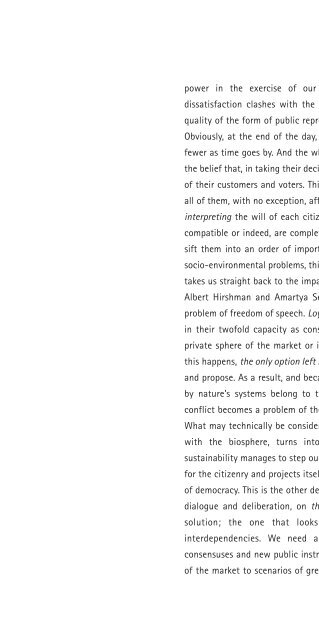

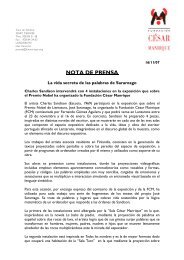






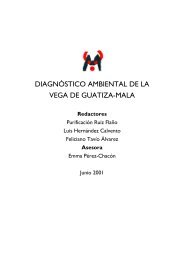

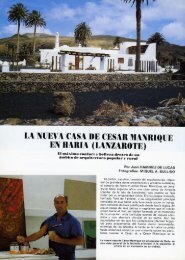

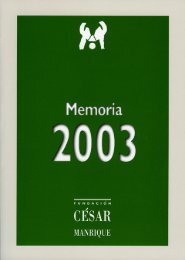
![Becas y premios de la Fundación César Manrique [1997-2006]](https://img.yumpu.com/20766851/1/184x260/becas-y-premios-de-la-fundacion-cesar-manrique-1997-2006.jpg?quality=85)
